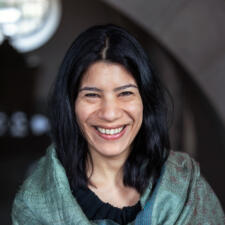Guest Essay in New York Times by CES Resident Faculty Maya Jasanoff
“The end of an era” will become a refrain as commentators assess the record-setting reign of Queen Elizabeth II. Like all monarchs, she was both an individual and an institution. She had a different birthday for each role — the actual anniversary of her birth in April plus an official one in June — and, though she retained her personal name as monarch, held different titles depending on where in her domains she stood. She was as devoid of opinions and emotions in public as her ubiquitous handbags were said to be of everyday items like a wallet, keys and phone. Of her inner life we learned little beyond her love of horses and dogs — which gave Helen Mirren, Olivia Colman and Claire Foy rapt audiences for the insights they enacted.
The queen embodied a profound, sincere commitment to her duties — her final public act was to appoint her 15th prime minister — and for her unflagging performance of them, she will be rightly mourned. She has been a fixture of stability, and her death in already turbulent times will send ripples of sadness around the world. But we should not romanticize her era. For the queen was also an image: the face of a nation that, during the course of her reign, witnessed the dissolution of nearly the entire British Empire into some 50 independent states and significantly reduced global influence. By design as much as by the accident of her long life, her presence as head of state and head of the Commonwealth, an association of Britain and its former colonies, put a stolid traditionalist front over decades of violent upheaval. As such, the queen helped obscure a bloody history of decolonization whose proportions and legacies have yet to be adequately acknowledged.
Elizabeth became queen of a postwar Britain where sugar was still rationed and rubble from bomb damage still being cleared away. Journalists and commentators promptly cast the 25-year-old as a phoenix rising into a new Elizabethan age. An inevitable analogy, perhaps, and a pointed one. The first Elizabethan Age, in the second half of the 16th century, marked England’s emergence from a second-tier European state to an ambitious overseas power. Elizabeth I expanded the navy, encouraged privateering and granted charters to trading companies that laid the foundations for a transcontinental empire.
Elizabeth II grew up in a royal family whose significance in the British Empire had swollen even as its political authority shrank at home. The monarchy ruled an ever-lengthening list of Crown colonies, including Hong Kong (1842), India (1858) and Jamaica (1866). Queen Victoria, proclaimed empress of India in 1876, presided over flamboyant celebrations of imperial patriotism; her birthday was enshrined from 1902 as Empire Day. Members of the royal family made lavish ceremonial tours of the colonies, bestowing upon Indigenous Asian and African rulers an alphabet soup of orders and decorations. In 1947, then-Princess Elizabeth celebrated her 21st birthday on a royal tour in South Africa, delivering a much-quoted speech in which she promised that “my whole life, whether it be long or short, shall be devoted to your service and the service of our great imperial family to which we all belong.” She was on another royal tour, in Kenya, when she learned of her father’s death.
